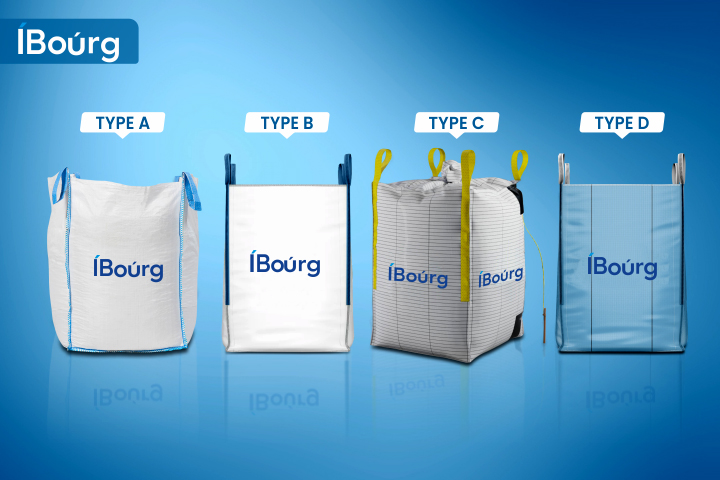Introduction: Exploring the World of FIBC Bags
FIBC bags are large, flexible, and collapsible containers made from woven polypropylene fabric or similar materials. Their design combines strength, durability, and versatility, making them ideal for transporting and storing a wide range of materials, from granules and powders to agricultural products and chemicals. FIBC bags are also known by various names, including bulk bags, big bags, jumbo bags, and super sacks, reflecting their different sizes and applications. These versatile containers come in various types, each tailored to specific applications and requirements. In this comprehensive guide, we will explore the different types of FIBC bags, their unique characteristics, and the industries that benefit from their use.

Type A FIBCs: The Standard Bag for Non-Flammable Products
Type A FIBC bags are the most basic and commonly used bulk bags. They are made from woven polypropylene fabric, which provides strength and durability. These bags offer minimal protection against static electricity and are non-conductive. Therefore, they are suitable for non-flammable and non-explosive materials like grains, sand, or plastic pellets. Type A bags are not designed for use with flammable or combustible products, as they do not provide any form of electrostatic protection.
Type B FIBCs: Designed for Flammable Materials with No Electrostatic Protection
Type B FIBC bags are similar in construction to Type A bags but incorporate anti-static properties. They are designed to safely transport materials that are prone to creating static electricity during filling and discharging processes. The anti-static properties in Type B bags dissipate static charges, reducing the risk of ignition and explosion. However, it’s important to note that Type B bags are not suitable for highly flammable materials.
Type C FIBCs: Safe Handling of Flammable Materials with Conductive Properties
Type C FIBC bags, also known as conductive bulk bags, are specifically engineered to handle flammable or combustible materials. They have conductive threads woven into the fabric to ensure that static charges are safely grounded, preventing sparks that could ignite the contents. Type C bags are suitable for products such as chemicals, solvents, or powders that pose a fire hazard. They are a crucial safety measure in industries where explosion risk is a concern.
Type D FIBCs: Providing Maximum Safety against Combustible Dust Hazards
Type D FIBC bags, often referred to as static protective or static dissipative bulk bags, are designed to safely transport sensitive materials, such as flammable powders or pharmaceuticals. Unlike Type C bags, they do not rely on conductive threads but instead utilize a static dissipative fabric. This fabric prevents the buildup of static charges and can be used in environments where flammable dust or gas atmospheres are present. Type D bags are considered safer than Type C bags for handling flammable materials because they eliminate the risk of sparks.
Selecting the Perfect FIBC Bag for Your Dry Bulk Material Handling Requirements
The world of FIBC bags is incredibly diverse, with each type designed to address specific safety, material handling, and storage requirements. Understanding the characteristics and applications of these various FIBC bag types is essential for industries seeking efficient and safe solutions for the transportation and storage of bulk materials. Whether it’s safeguarding against static electricity, complying with international regulations, or maintaining the integrity of food products, there is an FIBC bag type perfectly suited for the task.
Best FIBC Bags Manufacturers in India
When it comes to the world of Flexible Intermediate Bulk Containers (FIBC) or bulk bags in India, one name stands out prominently – iBourg. As a leading FIBC bag end to end cloud packaging manufacturer, iBourg has consistently proven itself as a trusted and innovative company in the industry. Let’s delve into what sets iBourg apart as one of the best FIBC bag manufacturers in India. Over the years, the company has built a strong reputation for producing top-tier FIBC bags that meet the stringent requirements of diverse industries. Their commitment to excellence is reflected in every aspect of their operations, from material selection to final product delivery.
There are four different types of FIBC bulk bags. We have listed them below:
1. Type A FIBC (Conductive FIBC)
2. Type B FIBC (Anti-Static FIBC)
3. Type C FIBC (Conductive FIBC)
4. Type D FIBC (Static Protective FIBC)

1 thought on “The Ultimate Guide to Understanding the Different Types of FIBC Bags: A, B, C & D”